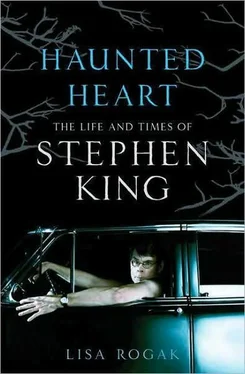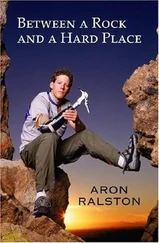Lisa Rogak
HAUNTED HEART
The Life and Times of Stephen King
FOR SCOTT MENDEL,
FOR DEALING WITH ME AND
MY FOIBLES FOR FIVE YEARS NOW
I’M AFRAID OF EVERYTHING.
—STEPHEN KING
It’s probably no surprise that his fears rule every second of Stephen King’s existence. He’s surrounded by them, and anyone who’s read even one of his novels knows that the most innocent item can be a harbinger of terror.
At various times through the years, King has rattled off a veritable laundry list of his fears: the dark, snakes, rats, spiders, squishy things, psychotherapy, deformity, closed-in spaces, death, being unable to write, flying—fill in the blank, the list is long. He’s described himself as having a permanent address in “the People’s Republic of Paranoia.”
His treatises on his fear of the number thirteen—triskaidekaphobia—are particularly revealing. “The number 13 never fails to trace that old icy finger up and down my spine,” he wrote. “When I’m writing, I’ll never stop work if the page number is 13 or a multiple of 13; I’ll just keep on typing till I get to a safe number.
“I always take the last two steps on my back stairs as one, making thirteen into twelve. There were after all, thirteen steps on the English gallows up until 1900 or so. When I’m reading, I won’t stop on page 94, 193, 382, since the sums of these numbers add up to thirteen.”
You get the picture. King—he prefers to be called Steve—draws upon his fears quite liberally in his writing, yet at the same time, part of the reason that he writes is to attempt to drown them out, to suffocate them and put them out of their misery once and for all so he’ll never be tormented by them again.
Yeah, right. He doesn’t believe it either.
The only way he can block them out is when he’s writing. Once he gets rolling and is carried along by a story about a particular fear, it’s gone, at least temporarily. He writes as fast and furiously as he can because if there’s one thing Stephen King knows after spending decades writing, it’s this: the moment the pen stops moving or the computer switches off, the fears will rush right back, ready for another round.
Despite his fear of therapists, he once went to see one. When he began cataloging his fears, the therapist interrupted him, telling him to visualize his fear as a ball he could close up in his fist. It was all he could do not to run for the door. “Lady, you don’t know how much fear I’ve got,” he replied. “I can maybe get it down to the size of a soccer ball, but fear is my living and I can only get it so small.”
In an exchange with Dennis Miller on his former TV talk show, Steve was thrilled to discover that he had found a kindred spirit in the Land of Fear. The men were discussing their shared dread of flying when King offered his theory about how the collective fear of people on a plane helps prevent a crash.
“Right,” said Miller with a knowing nod. “The degree of rigidity in our body keeps the wings up.”
Not quite, as Steve went on to explain. “It’s a psychic thing, and anybody with half a brain knows that it shouldn’t work. You have three or four people who are terrified right out of their minds. We hold it up. The flight you have to be afraid of is the flight where there’s nobody on who’s afraid of flying. Those are the flights that crash. Trust me on this.”
A few nervous laughs came from the audience. Both men blinked past the glare of the lights and then looked at each other. They think we’re kidding ?
Without fear where would Stephen King be? It’s almost as if he’s hooked on his anxiety, just one more thing for him to mainline, like the booze and drugs he was hooked on for decades. In fact, he’s made no secret of his lifelong struggle with substances.
“All those addictive substances are part of the bad side of what we do,” he said. “I think it’s part of that obsessive deal that makes you a writer in the first place, that makes you want to write it all down. Writing is an addiction for me. Even when the writing is not going well, if I don’t do it, the fact that I’m not doing it nags at me.”
One of the amazing aspects of Stephen King’s life is that his copious drug and alcohol abuse didn’t interfere with either the quantity or the quality of his prodigious output. However, while he would later acknowledge his surprise that his work didn’t suffer—especially when the haze was thickest—he’s also spoken with regret that he couldn’t remember writing certain books, such as Cujo . This clearly bothered him, for he always fondly looked back on each of his novels and stories, revisiting them as if they were old friends, rerunning the memories of the nuances and the ideas of a world and people that he just happened to have pulled out of his head.
Writing horror and telling stories had become so ingrained in him over the years that cranking out thousands of words every day of the year was second nature to him, despite a daily input of booze and drugs that would easily have killed a college kid on a weekend binge. Indeed, some of the tall tales and denial extended to what he told interviewers. For years, he told them that he wrote every day, taking a break from writing only on the Fourth of July, his birthday, and Christmas. That was patently untrue. He later said that he couldn’t not write every day of the year, but he thought telling fans that he allowed himself a whole three days away from writing made him seem more personable. He hadn’t yet realized that admitting his addictions to his fans would make him appear even more human.
While he’s long been an unapologetic admirer of everything mainstream—he’s referred to himself as the Big Mac of authors—he isn’t always comfortable on the pedestal. Steve’s iconic position in popular fiction was cemented early on, only a few years after his first novel, Carrie, was published. And yet, he isn’t above—or below—using his fame when it suits him.
King claims to hate being famous—his wife Tabby detests it even more, calling life with a celebrity spouse like being in “a goddamn fishbowl”—but even after three decades in the public spotlight, he still talks to journalists from media large and small, gives public talks, attends Red Sox games, and conducts book signings. After all, with more than thirty years in the business, his ability to sell books has little to do with whether he gives a bunch of interviews. Though he claims to be shy, he’s still as open and self-deprecating as he was when he first started out.
Then, of course, there’s the flip side: “When you get into this business, they don’t tell you you’ll get cat bones in the mail, or letters from crazy people, or that the people on the tour bus will be gathered at your fence snapping pictures.”
Because he lives a life that is so out and about, pick a random New Englander and chances are he’ll have a story about a Stephen King sighting.
A New Hampshire man who regularly visited Fenway Park knew that Steve had season tickets to the Red Sox games. For several years, he kept an eye out for Steve, but he never spotted him. One day at the stadium, he saw King walking toward him and he froze. He couldn’t think of anything to say. Finally, all he could come out with was “Boo!” as they came eye to eye. Steve said “Boo!” back and headed for his seat.
“He’s just a competitive guy who wants to be the best at what he does,” says Warren Silver, a friend from Bangor.
This, after sixty-three books published in thirty-five years, including collaborations, short-story collections—and having The Green Mile count as six separate books. Since the publication of Carrie in 1974, none of his books has been out of print, an accomplishment that can be matched by few bestselling authors. Proof still that his fears loom large.
Читать дальше












